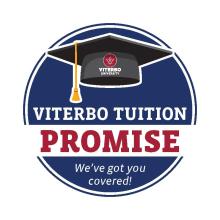Viterbo's Commitment to You
Viterbo University is committed to providing a mission-driven, private college education at an affordable rate.
The Viterbo Tuition Promise program covers any remaining tuition costs after grants and scholarships are applied. Low- and moderate-income Wisconsin households who qualify for the Federal Pell Grant may be eligible.
Viterbo Tuition Promise Eligibility Requirements
To receive assistance with your Viterbo University tuition, you must:
-
Be a Wisconsin resident .
-
File a Free Application for Federal Student Aid (FAFSA) and qualify for need-based Federal Pell Grant.
-
Live in on-campus housing.
-
Enroll as a traditional, full-time, first-time, first-year student.
-
Be attempting a first bachelor’s degree.
Note: A household adjusted gross income (AGI) of $75,000 or less may qualify. Federal Pell Grant eligibility considers income, household size, and other factors.
Viterbo Tuition Promise FAQs
What does the Viterbo Tuition Promise cover?
After all other scholarships and grants are applied to your financial aid package, the amount of your Viterbo Tuition Promise will cover any additional Viterbo University tuition. for the As a “last-fund-in" grant, the amount you receive will cover the rest of your remaining Viterbo tuition for fall and spring semesters for up to four consecutive years (eight semesters). The Viterbo Tuition Promise does not cover other common expenses, such as student activity or technology fees, course fees, housing, meals, or textbooks.
When do I receive the Viterbo Tuition Promise funding?
This funding will be added to your financial aid offer (generally, in the spring) and appear on your billing statement (late August, for fall). When additional scholarships or grants are reported, Viterbo Tuition Promise funding may need to be revised to take those into account.
How is income tied to the FAFSA and Federal Pell Grants?
Students and (typically) parents report their Adjusted Gross Income from the previous tax year on the FAFSA. That income is the main component for calculating for Federal Pell Grant eligibility. Because other factors are involved beyond income, there isn’t a specific income range that designates Pell Grant eligibility. However, traditionally, Federal Pell Grant recipient households have Adjusted Gross Incomes under $75,000, but, even more commonly, under $50,000.
How do I maintain the Viterbo Tuition Promise funding for subsequent academic years?
To remain eligible, you must:
- file a FAFSA annually.
- remain a full-time student in a traditional undergraduate program.
- live in on-campus housing.
Like other financial aid programs, you will need to remain in good academic standing and maintain satisfactory academic progress.
What if I’m not eligible for a Federal Pell Grant in future years?
Any change in Federal Pell Grant eligibility for subsequent academic years will not impact your eligibility for the Viterbo Tuition Promise. In other words, even if your financial situation changes, our promise to you does not.

